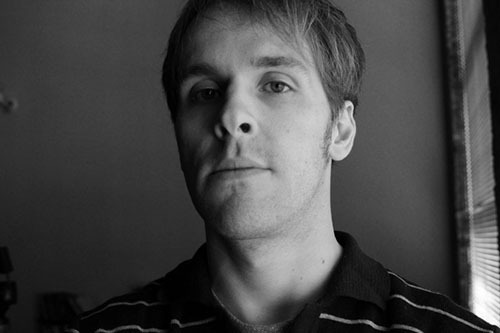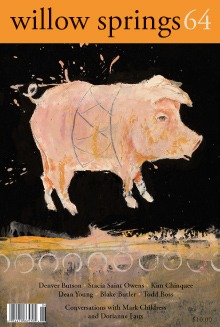
About Blake Butler
Blake Butler is the author of the novella EVER (Calamari Press) and the novel in stories Scorch Atlas (forthcoming 09/09/09 from Featherproof Books). He edits “the internet literature magazine blog of the future” HTMLGIANT, as well as two journals of innovative text: Lamination Colony, and concurrently with co-editor Ken Baumann, No Colony. His other writing has appeared in The Believer, Unsaid, Fence, etc. He lives in Atlanta and has recently completed, in addition to the 50 lists of 50, work on 3 novels.
A Profile of the Author
Notes on “Hair Loop”
These lists began at random as a way to kill time at work, launched one day when early one morning I got pissed off about a coworker telling me, “Good morning,” one of my least favorite expressions in the world, especially on the premises of a shitty desk job. I sat down then and typed out a list of 50 thoughts, mostly associative and containing leaps of logic based on my constant interruptions at that shitty desk job. Immediately after finishing that first list of 50, I committed myself to do a series of them, not knowing how long it would take me to do so, especially after getting fired during the writing of list 13, thus changing the entire nature of the creative environment.
These two lists, then, come rather deep into the project, numbers 28 (‘Hair Loop’) and 47 (‘Word Count’) respectively, at which point I was having long periods between each list, rather than how early on I would write 1 or even 2 a day. The process of challenging myself to not repeat myself in the format, and yet to continue exploring its limitations and the spaces peculiar to it that would make it not only justify its form, but make it work as new: this became more and more difficult, and yet also more and more enlivening when I felt I could bring it home. Looking back now that I have completed at least drafts of all 50 lists, I’ve begun to realize how much realizing the form really helped me learn a lot about myself as a writer, especially the use of form restraints, unusual modes of diction or speech, and ways of putting thoughts on paper that I likely never would have broached otherwise. Lists are fun.
Notes on Reading
I honestly think the most underrated book of the last 5 years is David Foster Wallace’s Infinite Jest. This might seem like a strange claim, considering how widely known and well regarded it is, but I’ve found that even among claimed Wallace fans, his masterpiece often remains avoided or placed aside (every time I hear a person say how much they love his nonfiction over his fiction, I cringe: yes, he’s a brilliant essayist, but dude…). It’s the nature of the doorstop-sized epic novel that it will be avoided by the majority, but what that books contains is multitudes far beyond even its mammoth size. Wallace gets consciousness, the movement of time, and intricately rendered real-time human thought processes and emotions more perfectlty than any other author you can name. That is a claim I’ll stand by to the end. Doesn’t hurt either that that is the book that made me want to be a writer. “Oh holy shit, this is what a book can do. My god.”
The same claim of underrated while seemingly overrated could be applied to Pynchon’s Gravity’s Rainbow, Gass’s The Tunnel, two books which supremely affected my want to write and understanding of the power of text as object. I got to those early, and could not get them out, and never will.
Reading is everything to me as a writer: without the reading, the consumption of new light, you are hobbling yourself, crossed in the dark. Anyone that would go to try to write a viable text without the consciousness and understanding grown from imbibing not only your own personal old or modern masters, but the continually recreating new heads, the feed, well, good luck Jack. Reading comes first: your own babble is for later.


